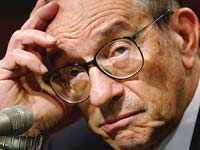 On 31 January, in just two weeks’ time, the world’s most influential economic police maker retires. Alan Greenspan has headed up the Fed (USA’s central bank) for the past 18 and a half years. And now he retires, to much adulation and acclaim. America’s economy has flown in the past decades. And Greenspan has seen his country through a tumultuous period of change, including the opening up of trade and capital flows with China, India, the former Soviet Union, and many emerging markets, as well as the impact of globalisation and information technology in transforming the world economy.
On 31 January, in just two weeks’ time, the world’s most influential economic police maker retires. Alan Greenspan has headed up the Fed (USA’s central bank) for the past 18 and a half years. And now he retires, to much adulation and acclaim. America’s economy has flown in the past decades. And Greenspan has seen his country through a tumultuous period of change, including the opening up of trade and capital flows with China, India, the former Soviet Union, and many emerging markets, as well as the impact of globalisation and information technology in transforming the world economy.
Like all central bankers, as he does not have that much influence — he can only change short-term interest rates; he has no control over bond yields, taxation or government spending and regulations. His every move has been watched as the biggest stockmarket bubble in history burst in 2000-1, as terrorists attacked mainland America and as oil prices have tripled. But is his legacy going to be a good one? I would like to suggest that it might be a case of short-term fixes having long-term disastrous effects. Maybe it’s even a case of Après moi, le deluge (“after me, the deluge” – see the article for more info on this famous quote).
Over the past two decades, the American economy has been characterised by increasingly flexible wages and prices, rapid immigration, new technologies, massive global competition, a robust banking system, sporadic bursts of productivity increase and ever increasing global interactions, all of which will have led to an improved economic position. None of these factors can be attributed to the central bank. The price of goods has generally been falling, and so additional money supply has not resulted in the traditional inflation, but rather in rising asset prices – in the stock market and more recently in housing prices. These increased asset prices on the problems in and of themselves, but they create problems as people borrow against the increased capital gain of their homes and thereby consume more. Massively increased consumer spending has boosted America’s GDP growth, but this has been done at the cost of a negative personal savings rate, a growing burden of household debt and the single biggest current-account deficit of all time (simply put, America is spending more than it earns – this cannot be sustained).
part of America’s current wealth is based not on genuine gains in net income and economic growth, nor is it a result of increased productivity, but rather it is simply about borrowing from the future. This is short-term thinking at its finest, and the Fed has often encouraged this by its actions – most recently keeping the interest rate artifically low for too long, and encouraging a glut of consumer spending. It was an Austrian economist, Ludwig Von Mises, who once said: “It may sometimes be expedient for a man to heat the stove with his furniture. But if he does, he should know what the remoter effects will be. He should not delude himself by believing that he has discovered a wonderful new method of heating his premises.” (Source: Great quotes).
Right now, America’s economic strength is based on an illusion. If, and when, that illusion crumbles the whole world will feel at. To his credit, Alan Greenspan, over the past few months, has been warning that house prices will not continue to increase and may even fall, and has been suggesting that foreigners will eventually stopped financing America’s current-account deficit. There is a limit as to how many dollars other countries want to accumulate in the reserves – China even hinted last week that it will start looking at other currencies in order to diversify its foreign exchange holdings. This can mean that the dollar will only move in one direction – down.
So, Alan Greenspan hands over an economy in a more vulnerable state then it has been for many a year. The lesson for the rest of the world is to begin to diversify relationships, create more connections outside of the USA and protect yourself against an American downturn. Luckily, the world economy has also grown and changed over the past two decades, and is likely to weather the storm much more effectively than it would have done when Greenspan came into office.


